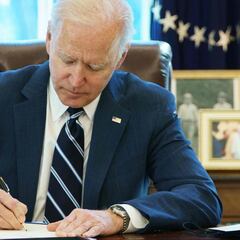Violence Against Women Act: what does it include and who voted for and against it?
The House of Representatives has passed legislation which aims to provide protection and support for survivors of domestic abuse and sexual assault.


On Wednesday the House of Representatives passed legislation reauthorizing the Violence Against Women Act (VAWA) with a bipartisan vote of 244-172.
The law was first introduced in 1994 and provides support for victims of sexual violence and domestic abuse. The legislation was reauthorized in 2013 but a logjam in Congress saw the protection lapse at the end of 2018. Despite this, the programmes included within the bill continue to be funded.
What is in the Violence Against Women Act?
The central tenant of the VAWA is to protect women from all forms of violence and the newest version that has just been passed extends the programmes included to cover a wider range of offences.
There is now funding for grants and other forms of support to tackle instances of sexual assault, domestic violence, dating violence and stalking. There is also additional effort made to deliver assistance to the victims after the fact and ensure that survivors are given the resources they need.
I’m outraged by last night’s murders in Atlanta. Over the last year, racist violence against Asian Americans has increased sharply, and women have borne the brunt. This must end now.
— Bernie Sanders (@SenSanders) March 17, 2021
A fact sheet produced by the House Judiciary Committee lists the provision of safe housing and economic support, such as protections for the unemployment benefits of women forced to leave unsafe workspaces, as key inclusions.
There is evidence that instances of domestic violence have increased during the pandemic. Speaking the importance of the WAVA one of the key champions of the origial bill, President Joe Biden, released a statement:
"Domestic violence is being called a pandemic within the Covid-19 pandemic, with growing evidence showing that the conditions of the pandemic have resulted in escalated rates of intimate partner violence, and in some cases more severe injuries."
Writing and passing the Violence Against Women Act is one of the accomplishments of which I’m most proud. While we have made significant progress, there is still much work to do. I’m grateful the House voted to strengthen and renew the law — and I urge the Senate to do the same.
— President Biden (@POTUS) March 18, 2021
Who voted for and against the Violence Against Women Act?
The bipartisan bill which called for the reauthorisation of the VAWA was introduced earlier this month by Democratic Representatives Sheila Jackson Lee of Texas and House Judiciary Chair Jerry Nadler of New York and Republican Representative Brian Fitzpatrick of Pennsylvania.
In a statement released when the bill was first tabled, Rep. Fitzpatrick said he was happy to support the bipartisan effort to provide greater protection to women:
"Congress has historically reauthorized VAWA with broad, bipartisan agreement, and I look forward to working alongside my colleagues to ensure that VAWA continues to protect victims and survivors across the nation.”
172 House Republicans voted against renewing the Violence Against Women Act.
— Kyle Griffin (@kylegriffin1) March 17, 2021
Related stories
The bill was supported by all 215 Democrats present in the chamber, with an additional 29 Republicans joining to support it. This ensured comfortable passage in the House but it is likely to face tougher opposition in the Senate, where the party split is 50-50.
It was the Senate who blocked the most recent attempt to reauthorize the VAWA in 2019, when then-Senate Majority Leader Mitch McConnell refused to allow the bill to go to a vote due to ongoing disputes about gun legislation.

